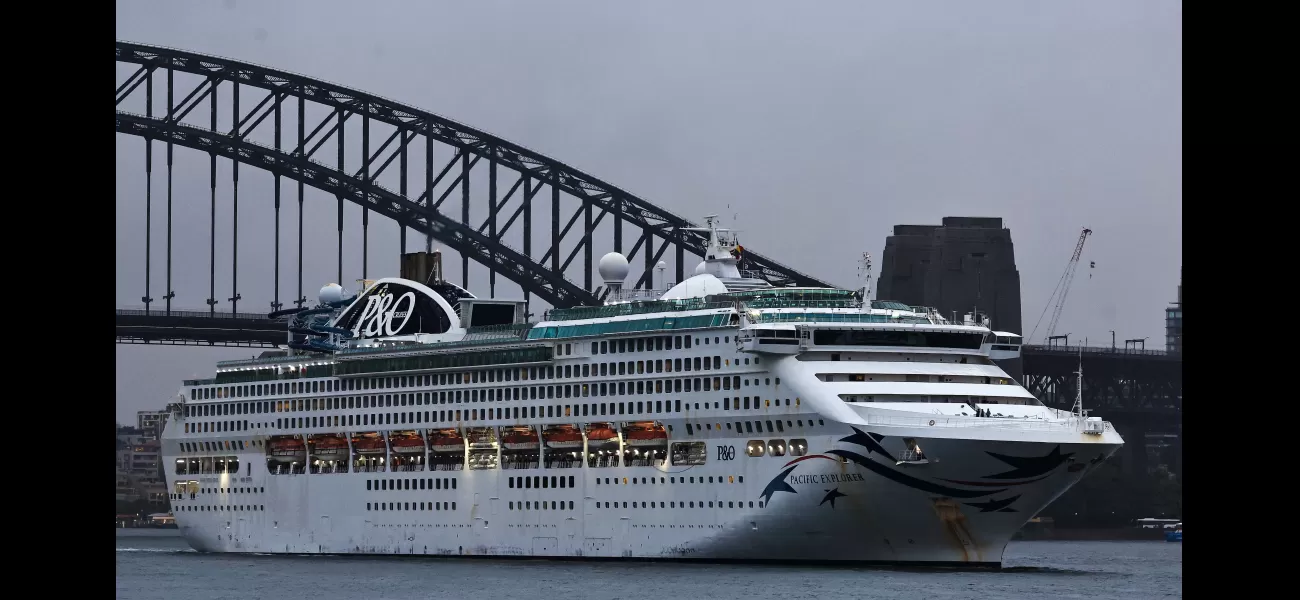Despite multiple cancellations, cruise industry leaders remain hopeful for the future.
Australian cruise industry head acknowledges recent cancellations and ship withdrawals, but remains positive for the future.
June 19th 2024.

Australia's cruise industry has been facing some challenges in recent months, causing concern among executives. The announcement of plans to close P&O cruise line, the withdrawal of Virgin Voyages from Australia, and the cancellation of cruise visits to Melbourne due to price hikes have caused turmoil in the $5.6 billion industry. Despite this, cruising remains a popular vacation choice, with a record 1.25 million Australians sailing last year. The majority of these cruises are taken close to home, making it a convenient and desirable option for many.
One of the main issues facing the industry is the high cost of cruising in Australia. This includes port fees, which can be up to triple the amount of other world ports. These costs have been blamed for the recent developments in the industry. In addition, the cruise industry is facing uncertainty as the paperwork that allows ships to operate in Australia is set to expire at the end of the year and has not yet been extended.
Joel Katz, the managing director of the Cruise Lines International Association Australia, acknowledges the current challenges but remains optimistic about the future. He acknowledges that the high costs and complex regulations have led to a contraction of the industry in Australia, but he believes this will be a short-term issue. He also highlights other factors, such as the weak Australian dollar and the long distances ships have to sail to do seasons in Australia, as contributing factors to the current situation.
Katz also mentions the need for exemptions to the Coastal Trading Act 2012 to be reviewed in order to make it easier for cruises to operate past the end of the year. He expects this review to take place in the next few months, and he calls on all levels of government and ports and destinations to work together to ensure Australia maintains its share of the lucrative cruise market. With 63 new cruise ships set to be built worldwide in the next decade, the potential for growth in this industry is immense.
Business leaders have also voiced their concerns about the current situation, pointing out that cruise ships are "mobile assets" that can be taken elsewhere if necessary. They urge authorities to be mindful of the high fees and charges that could potentially drive cruise lines out of the local market. This sentiment is echoed by independent cruise reviewer Adrian Tassone, who has launched a petition calling for urgent action from federal Transport Minister Catherine King to address the issue of the Coastal Trading Act 2012.
The recent developments in the cruise industry in Australia have led Tassone to declare that cruising in the country is "broken." He shares that his viewers are disappointed with the current situation, and some are even considering traveling overseas instead. Tassone expects prices to increase as a result of the current challenges facing the industry.
In November 2023, Princess Cruises and Cunard, both owned by Carnival, announced that they would no longer sail from Melbourne from the 2025-26 season due to an unreasonable port fee hike. In February, Virgin Voyages also pulled out after one season, citing the Red Sea conflict as the reason they were unable to bring their ships to Australia. Plans for future seasons using alternative routes have not yet been announced. Most recently, budget Australian cruise company P&O announced that it will be folded into its parent company Carnival in March 2025, with one ship being taken out of service. They cite significantly higher operating and regulatory costs in Australia as the reason for this decision.
The industry publication Cruise Passenger has reported that the port fees in Sydney and Melbourne are up to triple the amount of other parts of the world. A spokesperson from the Department of Infrastructure, Transport, Regional Development, Communications and the Arts has stated that a review into the Coastal Trading Act 2012 will be conducted shortly, but no decisions have been made at this time. They also mention that the current exemption has reduced red tape and costs for cruise operations in Australia.
Representatives from Port Authority of NSW and Ports Victoria have also spoken out, defending the fees they charge for visiting cruise lines. They state that these fees are necessary to cover the costs of infrastructure and services, and that any increases have been in line with inflation and construction costs.
Despite the current challenges facing the industry, it is clear that there is still a strong demand for cruising in Australia. The hope is that with collaboration and effective solutions, the industry will continue to thrive and provide Australians with an enjoyable vacation option. If you have a story to share about your experience with the cruise industry in Australia, please contact journalist Sarah Swain at [email protected].
One of the main issues facing the industry is the high cost of cruising in Australia. This includes port fees, which can be up to triple the amount of other world ports. These costs have been blamed for the recent developments in the industry. In addition, the cruise industry is facing uncertainty as the paperwork that allows ships to operate in Australia is set to expire at the end of the year and has not yet been extended.
Joel Katz, the managing director of the Cruise Lines International Association Australia, acknowledges the current challenges but remains optimistic about the future. He acknowledges that the high costs and complex regulations have led to a contraction of the industry in Australia, but he believes this will be a short-term issue. He also highlights other factors, such as the weak Australian dollar and the long distances ships have to sail to do seasons in Australia, as contributing factors to the current situation.
Katz also mentions the need for exemptions to the Coastal Trading Act 2012 to be reviewed in order to make it easier for cruises to operate past the end of the year. He expects this review to take place in the next few months, and he calls on all levels of government and ports and destinations to work together to ensure Australia maintains its share of the lucrative cruise market. With 63 new cruise ships set to be built worldwide in the next decade, the potential for growth in this industry is immense.
Business leaders have also voiced their concerns about the current situation, pointing out that cruise ships are "mobile assets" that can be taken elsewhere if necessary. They urge authorities to be mindful of the high fees and charges that could potentially drive cruise lines out of the local market. This sentiment is echoed by independent cruise reviewer Adrian Tassone, who has launched a petition calling for urgent action from federal Transport Minister Catherine King to address the issue of the Coastal Trading Act 2012.
The recent developments in the cruise industry in Australia have led Tassone to declare that cruising in the country is "broken." He shares that his viewers are disappointed with the current situation, and some are even considering traveling overseas instead. Tassone expects prices to increase as a result of the current challenges facing the industry.
In November 2023, Princess Cruises and Cunard, both owned by Carnival, announced that they would no longer sail from Melbourne from the 2025-26 season due to an unreasonable port fee hike. In February, Virgin Voyages also pulled out after one season, citing the Red Sea conflict as the reason they were unable to bring their ships to Australia. Plans for future seasons using alternative routes have not yet been announced. Most recently, budget Australian cruise company P&O announced that it will be folded into its parent company Carnival in March 2025, with one ship being taken out of service. They cite significantly higher operating and regulatory costs in Australia as the reason for this decision.
The industry publication Cruise Passenger has reported that the port fees in Sydney and Melbourne are up to triple the amount of other parts of the world. A spokesperson from the Department of Infrastructure, Transport, Regional Development, Communications and the Arts has stated that a review into the Coastal Trading Act 2012 will be conducted shortly, but no decisions have been made at this time. They also mention that the current exemption has reduced red tape and costs for cruise operations in Australia.
Representatives from Port Authority of NSW and Ports Victoria have also spoken out, defending the fees they charge for visiting cruise lines. They state that these fees are necessary to cover the costs of infrastructure and services, and that any increases have been in line with inflation and construction costs.
Despite the current challenges facing the industry, it is clear that there is still a strong demand for cruising in Australia. The hope is that with collaboration and effective solutions, the industry will continue to thrive and provide Australians with an enjoyable vacation option. If you have a story to share about your experience with the cruise industry in Australia, please contact journalist Sarah Swain at [email protected].
[This article has been trending online recently and has been generated with AI. Your feed is customized.]
[Generative AI is experimental.]
0
0
Submit Comment




